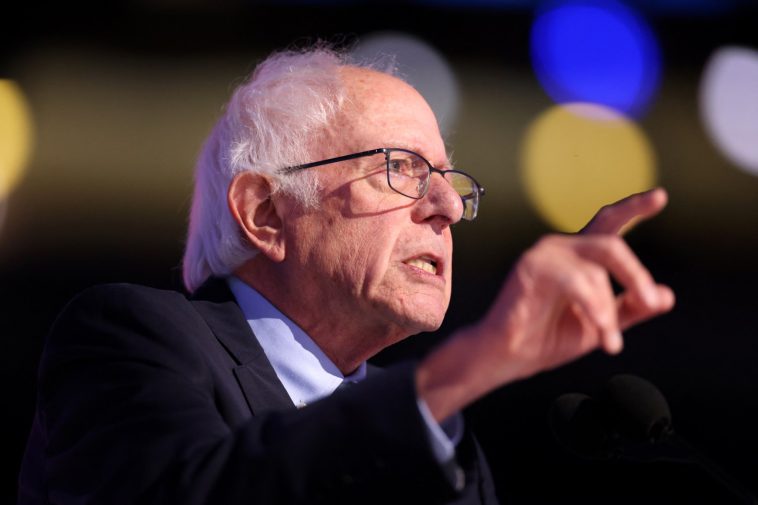Over the weekend, Senator Bernie Sanders, who is largely regarded for his socialist perspectives, conceded that Vice President Kamala Harris seems to be changing her stance on pivotal issues, not necessarily because of personal conviction, but rather with a focus on outpacing the former President, Donald Trump. Sanders articulated these thoughts in a Sunday discussion revolving around the unpredictable dynamics of the 2024 presidential race.
During the conversation, the interviewer had an intriguing remark up his sleeve regarding three key political points. He elegantly related those issues to both Sanders and Harris. ‘Aside from your advocacy of the Green New Deal, the implementation of Medicare-for-all single-payer in healthcare, and ending fracking, all positions you resolutely stand by, Vice President Harris once allied with you on these platforms but now seems to be standing in opposition to you on all three,’ the interviewer pointed out. His next question was direct: ‘Do you think her reversal on these issues is a misstep?’
To this, Sanders gave a somewhat nuanced response: ‘What I observe is a collective effort driven by several different factions within the Democratic party. It’s a mix of mainstream Democrats, forward-thinking Democrats, and progressive independents, a group I identify with, being the longest-serving independent in American history. Their shared objective appears to be to counter a potent contender, that is Donald Trump.’
Sanders’ comments came into focus following a line of inquiry in which the interviewer cited several of Sanders’ campaign trail pronouncements regarding his vision for policy implementation in the United States. These comments underscored Sanders’ beliefs and stances, particularly in regards to the issues where Harris seemingly shifted her positions.
One such statement from Sanders went as follows: ‘I take great pride in revealing that I am an original co-sponsor of the Green New Deal proposal.’ Giving further insight into his policy view, he had proclaimed, ‘Our path forward includes moving towards a Medicare-for-all single-payer program. If we aim to tackle climate change in all earnestness, it’s imperative to cease fracking altogether.’
While these comments reveal the hard-line position of Sanders on these key issues, they also highlight the considerable shift in Harris’ own approach. Notably, Vice President Harris had at one time presented identical views on these central policy matters but has recently shown an alarming tendency to sway away from these previously held stances.
Sanders implied that he interprets this shift more as a strategic move rather than a fundamental change in principles. The change in Harris’ position, according to Sanders, seems more related to the dynamics of the 2024 presidential race, where she must compete against formidable opponents, notably Donald Trump.
It’s crucial to note that Sanders’ comments convey understanding and acceptance of this change in Harris’ stance, seeing it as a combination of different interest groups unified under the broader Democratic umbrella. His comments suggest that he is not as much troubled by her U-turns as he is invigorated by the prospect of confronting a common adversary.
These shifts in policy perspectives are not new in the political landscape. It is often noted that these transitional phases occur to project candidates in a more favorable position based on changing electoral dynamics. However, Harris’s shift, as pointed out by Sanders, seems to be more due to countering a particular candidate rather than a broad change in political worldview.
Sanders, in the conversation, reiterated his commitment to championing progressive policies such as the Green New Deal and complete healthcare reform through a Medicare-for-all approach. His stance speaks to his long-held beliefs, irrespective of electoral politics, that these are urgent matters that merit concentrated focus.
Contrastingly, Harris seems to have taken a more opportunistic course, anticipating what political stances would resonate best with the voting public she is aiming to captivate. This politically charged change in stance is typical of the ebb and flow of political currents and the constant adjustments politicians make to gain an upper hand.
In his analysis, Sanders exhibits a keen understanding of the inherent complexities of political maneuvers and the realpolitik involved. His expression of these observations reflects the pragmatic side of long-term involvement in politics, acknowledging that sometimes drastic adjustments are deemed necessary in striving towards a collective goal.
Interestingly, Sanders does not seem to express direct criticism of Harris, despite the notable divergence in their positions. Instead, he signifies an eerie understanding of the competitive reality of contemporary American politics; sometimes, change is not just inspired by ideology but also sculpted by the pressures of electoral politics.
Taking his comments into proper perspective, it appears clear that Sanders, while standing firmly by his principles, is aware of the need for strategic political alignment. On the surface, this could be misinterpreted as compromise, but on deeper analysis, it displays strategic insight into navigating the divisive waters of American politics.
The interview, besides offering an interesting analysis of Sanders’ viewpoint, also succeeds in shedding light on the broader dynamics that influence American politics. The strategic maneuvers that politicians undertake can seem perplexing at times, but a perceptive eye can reveal the calculated strategies and ideological tapestries that underlie the turbulent political landscape.
In conclusion, the shifting political landscape is ever-evolving, with candidates continually updating, refining, and sometimes completely overhauling their stance on key issues. While voters need to be aware of these shifts, understanding the reasons behind them can illuminate the greater political workings. As Sanders subtly revealed in the interview, sometimes, political shifts are not signaling a change of heart, but rather a change of strategy.
TAPPER: Kamala supported the Green New Deal, Medicare For All, and a ban on fracking. Is she making a mistake reversing those positions?
BERNIE: She’s trying to beat Donald Trump.
There you have it. Kamala hasn’t “changed” — she’s just trying to get elected. pic.twitter.com/BfLonG9ga3
— Trump War Room (@TrumpWarRoom) October 20, 2024


